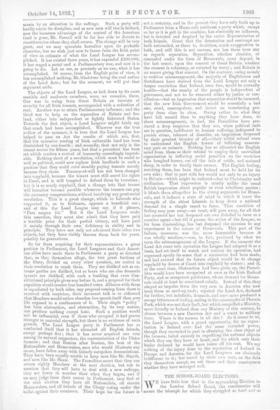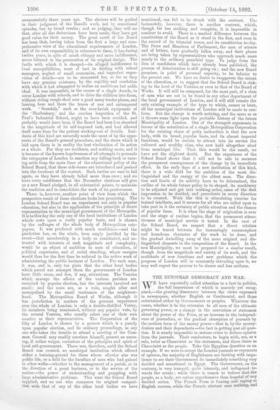THE SCHOOL-BOARD ELECTIONS.
WE have little fear that in the approaching Election to the London School Board, the reactionaries will secure the triumph for which they struggled so hard and so
unsuccessfully three years ago. The electors will be guided in their judgment of the Board's work, not by sensational episodes, but by broad results ; and so judging, they will see that, after all due deductions have been made, they have got good value for their money. The great merit of the Board has been that, having taken from the first a large and com- prehensive view of the educational requirements of London, and of its own responsibility in reference to them, it has during twelve years, in spite of much obloquy and more indifference, never faltered in the prosecution of its original design. The faults with which it is charged—its alleged indifference to local susceptibilities, want of tact in dealing with school managers, neglect of small economies, and imperfect super- vision of details—are to be accounted for, so far as they have any genuine existence, by the rapidity and resolution with which it haii attempted to realise an ambitious but noble ideal. It was impossible, in the course of a single decade, to cover London with schools, and to drive the children into them, without riding rough-shod over a good many tender places, and leaving here and there the traces of raw and untempered work. " Scandals," such as the over-lavish equipment of the Shaftesbury,' and the careless inspection of the St. Paul's Industrial School, ought to have been avoided, and probably would have been, if the Board had been less absorbed in the magnitude of its self-imposed task, and had allowed itself more time for the patient working-out of details. Inci- dents of this kind are naturally made the most of by the oppo- nents of the Board's general procedure, and the stress which is laid upon them is in reality the best vindication of its action as a whole. For they are incidents, and nothing more, and it is because of the known hopelessness of all attempts to persuade the ratepayers of London to sanction any falling-back or turn- ing aside from the main lines of the educational policy of the School Board, that these side-issues are introduced and pushed into the forefront of the contest. Such tactics are sure to fail again, as they have already failed more than once ; and we have every confidence that the November elections will give us a new Board pledged, in all substantial points, to maintain the tradition and to consolidate.the work of its predecessors.
There is, however, another point of view from which the prospective result of these elections looks less promising. The London School Board was an experiment not only in popular education, but also in the application of the principle of direct representation to the municipal government of the Metropolis. It is to this day the only one of the local institutions of London which- rests upon a really popular basis, and is chosen by the suffrages of the whole body of Metropolitan rate- payers. It was predicted with much confidence—and the prediction has, on the whole, been amply justified by the event—that membership in a body so constituted, and en- trusted with interests of such magnitude and complexity, would be an object of ambition to men of education, of political experience, and of social standing, whose energies would thus for the first time be enlisted in the active work of administering the public business of London. For such men, it was, and is, only too plain that the other local bodies which parcel out amongst them the government of London have little room, and few, if any, attractions. The Vestries which manage the affairs of the various parishes are recruited by popular election, but the interests involved are small; and the seats are, as a rule, sought after and monopolised by the small tradesmen of the neighbour-
hood. The Metropolitan Board of Works, although it has jurisdiction in matters of the greatest importance over the, whole of London, is only a double-distilled Vestry, its members being nominated, without any popular vote, by the several Vestries, who usually select one' of their own number as their representative. The Corporation of the City of London is chosen by a process which is a parody upon popular election, and its ordinary proceedings, as any one who takes the trouble to attend a meeting of the Com- mon Council may readily convince himself, present an amus- ing, if rather vulgar, caricature of the principles and spirit of local self-government. There was, therefore, until the School Board was created, no municipal institution •which offered -either a training-ground for those whose • ulterior aim was public life, or a field for the faculties of men who had gained in other walks—whether in the management of a parish, or in the direction of a great business, or in the service of the nation—the power of understanding and grappling with large administrative problems. This want the School Board supplied, and no one who compares its original coniposi- Lion with that of any of the other local bodies we have
mentioned, can fail to be struck with the contrast. Un- fortunately, however, there is another contrast, which, though far less striking and complete, it is impossible in candour to avoid. There is a marked difference between the constitution of the Board as it stood in the first, and even in the second of its triennial terms, and its constitution to-day. The Peers and Members of Parliament, the men of science and of letters, have gradually fallen away, and their places are being taken by representatives who approach much more nearly to the ordinary parochial type. To judge from the lists of candidates which have already been published, the process of deterioration is still going on ; and the new Board promises, in point of personal capacity, to be inferior to the present one. We have no desire to exaggerate the extent of the alteration, or to suggest that the School Board is sink- ing to the level of the Vestries, or even to that of the Board of Works. It will still be composed, for the most part, of a class of men who are not to be found in any other department of the local government of London, and it will still remain the only existing example of the type to which, sooner or later, all the municipal institutions of London will be made to con- form. But the change is worth noticing, and the more so as it throws some light upon the probable history of the future Municipality of London. One of the strongest arguments in favour of the substitution of a single Metropolitan Corporation for the existing chaos of petty authorities is that the new body, with its broad, popular basis, and its almost imperial functions, would be certain to attract into its service the cultured and wealthy class, who now hold altogether aloof from municipal life. That this would be the result, we have not the slightest doubt. But the experience of the School Board shows that it will not be safe to measure the permanent consequences of the change by its immediate effect. In the early days of a new institution of this kind, there is a wide field for the ambition of the most dis- tinguished and the energy of the ablest men. The direc- tion and limits of its activity have to be determined, the outline of its• whole future policy to be shaped, its machinery to be adjusted and got into working order, cases of the first impression to be decided, and precedents in every direction to be created. Work like this is stimulating exercise for trained intellects, and it secures for all who are called upon to take part in it the certainty of public attention and the chance of popular fame. It is when the stage of origination is over and the stage of routine begins, that the permanent attrac- tiveness of municipal service is tested. In the case of the School Board, we suspect that a direct relation might be traced between the increasingly commonplace and humdrum character of the work to be done, and the gradual dwindling away of the more original and dis- tinguished elements in the composition of the Board. In the new Municipality, we must be prepared for a similar result, though from the magnitude and variety of its work, and the multitude of new functions and new problems which the. progress of London will be constantly obtruding upon it, we may well expect the process' to be slower and less uniform.



































 Previous page
Previous page